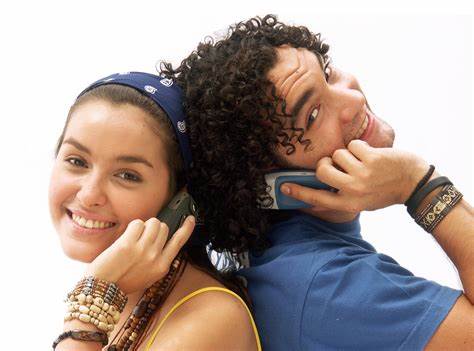(单词翻译:单击)
听力文本
Education Tips: What is Good Digital Citizenship?
Some adults and teachers may think young people want to spend all of their time using social media. But a recent survey shows that may not be true. It found that students sometimes want to turn off their electronic devices to get away from the pressure to take part in social media.
For the study, researchers led a series of discussions at classes in the United States. They asked young people what they thought about social media.
The survey was a project of Common Sense Media, a non-profit group based in California, and a learning games platform called Kahoot!.
Eight out of ten students said that "some people think too much about their social media posts and are always trying to be perfect." About a third said it was acceptable "to post a version of yourself on social media that's not 100 percent real."
The students also talked about the issue of publishing unkind or hateful comments online. More than half of those questioned said that social media are "tearing us apart more than they are bringing people together."
With this in mind, how can teachers help?
Today, we will look at how teachers can support good digital citizenship through safe, kind and healthy use of social media. Common Sense Media defines digital citizenship as "thinking critically, behaving safely, and participating responsibly in the digital world."
For more about this subject, see the VOA Learning English series on News Literacy.
Teachers can begin by talking with students about how they use social media. How does it make them feel? Do the young people want to change anything about the way they interact with others online?
Teachers should learn what computer application programs their students use most often. Teachers should then use this information to keep in contact with students and share homework assignments.
Next, define the words cyberbullying, digital drama and hate speech. Young people need to recognize the differences among these issues and know how to deal with them.
Common Sense Media has free lesson plans for all grade levels on digital citizenship. They include videos and other images to explain the ideas at the student's level.
"Digital drama" is the everyday arguments and small problems that come up between friends or with other people you know online or via text message.
"Hate speech" means expressing hatred of a particular group of people. For younger students, this is called 'being mean.' Teachers should let students know they are available to help when students face online problems.
Experts say teachers should choose a social media app their students often use. Limit posts or messages to once per class period or to what is necessary to provide information to students.
Bayly DiPilato is an English teacher and lives in New Jersey. She told National Public Radio that she did not want to use Facebook to communicate with students because it is too personal. Although her students have email, she found they do not often look at it.
DiPilato instead chose the social networking service Twitter to give out homework and reading materials. She says Twitter lets her share information quickly and show how to use social media in a professional, healthy way.
Another idea is to get students to ask questions on the shared app, as one person's question is probably shared by others. Teachers have to make sure they do not help one individual without giving the same information to all students.
Experts also say teachers need to set time limits for using social media with students. Teachers could say they will only answer questions until nine at night on school nights, for example. They need to explain that adults, too, need to 'unplug' sometimes and get away from their phones and computers.
Part of digital citizenship is related to privacy. When sharing something done in class, teachers must remember to post pictures of students' work but not of the students themselves. This is done to protect the online privacy of students.
Social media, electronics and digital resources are an increasingly large part of students' lives. Experts say that with the guidance of teachers and other adults, young people can learn to become good digital citizens.
I'm Jill Robbins.
重点解析
重点讲解:
1. turn off 关闭;关掉;
I have to get up and turn off the radio.
我必须起床关上收音机。
2. more than 超过;不止;
If it was me, I'd want to do more than just change the locks.
如果是我,我要做的就不仅仅是换锁了。
3. be available to 可以用来;可提供给;
I will be available to meet with you to discuss your drafts and revised essays.
到时我可与你见面,讨论草稿和修改稿。
4. get away from 逃离;摆脱;
People want to get away from the drudgery of their everyday lives.
人们想摆脱日常生活中单调乏味的工作。
参考译文
教育小贴士——怎样才是好的数字公民?
一些成年人和老师可能认为,年轻人想把所有时间都花在社交媒体上。但最近的一项调查显示,事实可能并非如此。研究发现,学生有时想关掉电子设备,以摆脱卷入社交媒体的压力。
在这项研究中,研究人员在美国学校的课堂上领导了一系列的讨论。他们询问年轻人对社交媒体的看法。
该调查是总部位于加州的非营利性机构常识媒体和全球学习平台Kahoot!的一个项目!
十分之八的学生说,“有些人过多的考虑自己发布在社交媒体上的帖子,总是试图让它看上去十分完美。”大约三分之一的学生说,“在社交媒体上发布的帖子,不那么完美”是可以接受的。
学生们还谈到一个问题,就是在网上发表不友善或表达仇恨的评论。超过一半的受访者表示,社交媒体“拆散人们之间的关系,而不是让大家聚集在一起。”
鉴于此,老师们该怎么提供帮忙呢?
今天,我们将探讨教师如何通过安全、友好和健康地使用社交媒体,来支持学生们拥有良好的数字公民身份。常识媒体将数字公民定义为“批判性思维、安全性行为和负责任地融入数字世界。”
有关此主题的更多信息,请参阅美国之音新闻素养英语学习系列。
教师可以从与学生讨论他们该如何使用社交媒体开始,社交媒体让他们有什么样的感觉?年轻人想改变他们在网上与他人互动的方式吗?
教师应该了解学生最常使用的计算机应用程序,然后利用这些信息与学生保持联系,并分享作业。
接下来,定义网络欺凌、数字戏剧性事件和仇恨言论。年轻人需要认识到这些问题之间的差异,并知道如何处理这些问题。
常识媒体对于所有年级的学生,都提供有关数字公民的免费课程计划,包括从学生层面解释该理念的视频和其他图像。“数字戏剧性事件”,是指朋友之间或与你在网上或通过短信认识的人之间发生的日常争论和小问题。
“仇恨言论”是指表达对某一特定群体的仇恨。对于较年轻的学生来说,这叫做“刻薄”。当学生在网上遇到问题时,老师应该让学生知道他们可以向老师寻求帮助。
专家表示,教师应该选择学生经常使用的社交媒体应用。限制每节课能发的帖子或信息数量,或向学生提供信息所需的内容。
贝利·迪皮拉托是一名住在新泽西州的英语教师,她告诉国家公共广播电台,她不想用脸书与学生交流,因为它太私密了。虽然她的学生有电子邮件,但她发现他们并不经常查看邮件。
迪皮拉托选择了社交网络服务推特,来分发家庭作业和阅读材料。她说推特可以让她快速分享信息,并展示如何以专业、健康的方式使用社交媒体。
另一个想法是让学生在共享应用上提问,因为一名学生遇到的问题,可能其它学生也碰到了。教师必须确保,帮助一名学生时,也向其他所有学生提供了相同的信息。
专家们还表示,教师需要设定与学生一起使用社交媒体的时间限制。例如,老师们可以说,他们只会在上课日的晚九点前回答问题。他们需要解释的是,成年人有时也需要“拔掉插头”,远离手机和电脑。
数字公民的部分内容与隐私有关,当分享课堂上所做的事情时,老师必须记住张贴学生作品的照片,而不是学生本人的照片。这样做是为了保护学生的在线隐私。
社交媒体、电子产品和数字资源在学生生活中的比重越来越大。专家们表示,在老师和其他成年人的指导下,年轻人可以学会成为一名优秀的数字公民。
吉尔·罗宾斯报道。
译文为可可英语翻译,未经授权请勿转载!


